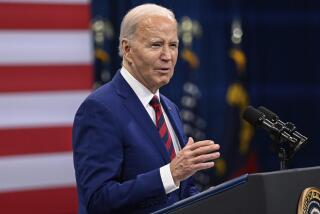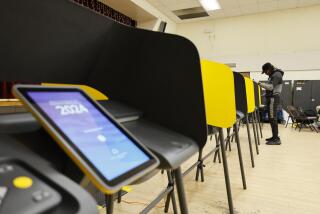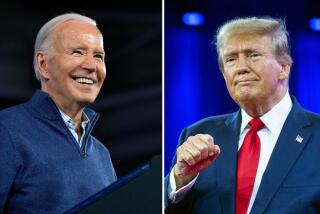Obama and Romney working two different angles
LEXINGTON, Ky. — With election day about three weeks away, a tight contest between President Obama and Mitt Romney is coming down to a choice between trust and change.
The Republicans are counting on a restive electorate, a sluggish economy and stubbornly high unemployment to make 2012 the fourth change election in a row. In 2006, voters tossed the GOP out of power in Congress. In 2008 they turned the White House over to the Democrats. Then, with joblessness near 10%, they gave the House of Representatives back to the Republicans in 2010.
Resisting change this time —by reelecting Obama — would mean more economic misery, Romney tells voters as he criticizes the president for failing to outline detailed plans to speed up the economy and fix the government’s long-term debt crisis.
“He wants to do the same thing he’s been doing,” the GOP nominee told thousands at an outdoor campaign rally Friday in suburban Richmond, Va. “It’s a status-quo plan [that] leads to high unemployment, no wage growth and, of course, to fiscal calamity down the road for our nation.”
Obama has spent months aggressively countering Romney’s arguments. At the same time, his campaign has attempted to change the subject to matters of trust with a mixture of personal and substantive attacks that have made it tougher for the Republican challenger to gain voter confidence.
Vice President Joe Biden contended in Thursday night’s vice presidential debate with Rep. Paul D. Ryan that the Republicans are pushing the wrong solutions on a broad range of issues, including abortion, taxes and the government programs that millions of seniors depend upon.
“Look, folks, use your common sense. Who do you trust on this?” Biden said, pointing to Romney’s plan to turn Medicare into a voucher program and to earlier Ryan proposals for partial privatization of Social Security.
New Obama campaign ads in battleground states are hitting at Romney’s plan to cut Medicaid, the healthcare program for the poor that also covers long-term care for many middle-income seniors. The ads warn that Romney would “burden families with the cost of nursing home care,” while assuring voters that Obama “won’t let that happen.”
The latest commercials follow months of earlier Obama ads designed to drive up negative impressions of Romney and feed the notion that he lacks understanding or concern for the problems of everyday Americans. Those ads highlighted Romney’s personal wealth by criticizing his relatively low income tax rate and offshore investments, questioned his business dealings with companies that send jobs overseas, and recycled his own damaging comments that portrayed 47% of Americans as dependent on government and lacking responsibility for their lives.
But Romney’s strong debate showing last week helped improve his favorable ratings in the polls. And Republicans are counting on dissatisfaction with Obama to overcome any residual doubts that voters may have about Romney.
In classic challenger fashion, the former Massachusetts governor has attempted to make the election about Obama’s handling of the economy, the top concern of most voters.
Polling conducted since the first debate has found that Romney, who is running on his experience in business, is now seen as better able than Obama to cut the government’s budget deficit and improve the job situation. At the same time, most Americans continue to believe that the country is headed in the wrong direction, a barometer that typically favors a challenger.
More recently, Romney has begun going after the president’s record in foreign policy, a realm in which Obama’s standing has slipped in the wake of recent events overseas.
“It is time to change course in the Middle East,” Romney said this week, amid continued unrest in the region.
The 2012 election is playing out against a backdrop of stark partisan division that has changed little in the last dozen years, a period in which two of three presidential elections were decided by 2.5 percentage points or less.
Democrats have been encouraged by public opinion surveys that show a rise in voter optimism of late, probably because of the slowly recovering economy. Another positive factor for the president: His job approval stands at 50% in the latest Gallup poll — that’s lower than Presidents Reagan and Clinton and slightly higher than George W. Bush at the same point in their terms; all won reelection. The most recent presidents who lost reelection races, George H.W. Bush and Jimmy Carter, had job approval ratings below 35% at this stage.
A Gallup poll released Friday gave Romney a 2-percentage-point lead over Obama among likely voters, within the poll’s 2-point margin of error.
Quickie polls of vice presidential debate watchers suggested no clear winner from this week’s debate, and attention is already shifting to the second encounter between Obama and Romney next Tuesday. The president remained out of public view for much of Friday and is to travel to Williamsburg, Va., on Saturday for three days of debate preparations; Romney, too, is expected to study for the debate this weekend.
Times staff writer Seema Mehta in Chesterfield, Va., contributed to this report.
More to Read
Start your day right
Sign up for Essential California for news, features and recommendations from the L.A. Times and beyond in your inbox six days a week.
You may occasionally receive promotional content from the Los Angeles Times.






